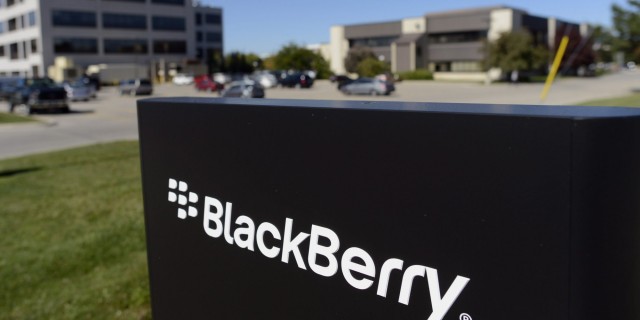
BlackBerry reported its fiscal Q4 earnings this morning, and the results are both disappointing and better than expected. Losing 8c per share, an adjusted net loss of $42 million after tax benefits, the company earned $976 million in revenue, below analysts estimates. GAAP net loss was $423 million, or 80c per share.
Though BlackBerry still has $2.7 billion in cash, largely due to an accumulation of tax refunds and the in-progress sale of its real estate, the number is still down from $3.2 billion in the previous quarter.
John Chen, the new CEO, said he was pleased with the performance of the company, and the stock, in recent months, but that there is a lot of work still to do. BlackBerry recognized revenue on 1.3 million smartphones in Q4, down 600,000 from Q3 and a long way from its highs.
There are some highs in the announcement, though: gross margins are up to 43% from 34% in Q3. This is likely due to the continued focus on creating a leaner company, selling high-margin services solutions like BES 10, which is now compatible with iOS and Android in addition to BlackBerry devices. The company derived the majority of its revenue, 56%, from services, while only 37% came from hardware.
An interesting stat is that 3.4 million BlackBerry devices were actually sold in Q4 — and 2.3 million of them were BlackBerry 7 devices — even though the company only recognizes 1.3 million of them the revenue column, since they “sold” them to suppliers in previous quarters.
“I am very pleased with our progress and execution in fiscal Q4 against the strategy we laid out three months ago. We have significantly streamlined operations, allowing us to reach our expense reduction target one quarter ahead of schedule,” Chen said. “BlackBerry is on sounder financial footing today with a path to returning to growth and profitability.”
The company is attempting to derive revenue in the few remaining strong areas of its business. This week, BlackBerry announced its plans to monetize BBM, its popular messenger service used by 85 million people around the world. By adding sponsored content in the Updates field — remember, “the chat is sacred” — and partnering with brands on BBM Channels, users will presumably get content they actually want to see. Of course, BlackBerry will be selling stickers as well, something that companies like LINE, WeChat, Viber, Path, Kik and others have found success with.
During an earnings call this morning, Chen said that the company will release three “high-end smartphones” made for keyboard lovers in the next 18 months. We already know about the “classic” Q20, though we haven’t seen what it looks like, and the low-cost, Foxconn-designed Z3 is coming soon to Indonesia, but it’s strange that the company, losing so much money in the hardware business, plans to continue on that path.
Chen also stated that due to high demand, he will restart production on the Bold 9900, one of the company’s most popular devices despite the presence of BlackBerry 10. BlackBerry will begin selling the Q20, also known as “The Classic,” later this year, and introduce BES 12 at the same time. Chen’s goal is to use the Classic, which runs BB10 but maintains the tool belt of buttons that legacy BB7 users love so much, to bridge the gap between the two platforms. The issue right now is that BlackBerry 10 is selling poorly in most regions, and BB7 is selling well in developing markets; the Z3 and future keyboard-centric BB10 models are meant to make the prospect of running the company’s newest OS more attractive to the average consumer.
Ultimately, despite the loss, Chen is “extremely pleased” with the Q4 results, and plans to bring the company into profitability with a “direct to enterprise” sales focus.
MobileSyrup may earn a commission from purchases made via our links, which helps fund the journalism we provide free on our website. These links do not influence our editorial content. Support us here.


